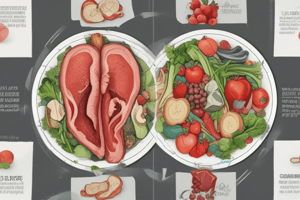Podcast
Questions and Answers
What is the primary function of BMR in the body?
What is the primary function of BMR in the body?
- To assist in the digestive process
- To increase physical activity levels
- To maintain life at rest (correct)
- To regulate body temperature
Which of the following conditions is NOT considered a part of basal condition for BMR?
Which of the following conditions is NOT considered a part of basal condition for BMR?
- Post absorptive phase
- Thermo neutral environment
- Physical activity (correct)
- Mental rest
How does age affect BMR according to the content provided?
How does age affect BMR according to the content provided?
- Younger individuals have a higher BMR due to greater muscle mass
- BMR is unaffected by age throughout life
- Older adults usually have a higher BMR due to metabolic changes
- BMR decreases with age due to decreased physical activity (correct)
Which factor does NOT influence BMR?
Which factor does NOT influence BMR?
What role does lean muscle mass play in BMR?
What role does lean muscle mass play in BMR?
Flashcards
Basal Metabolic Rate (BMR)
Basal Metabolic Rate (BMR)
The minimum energy needed by your body to stay alive when at complete rest, like sleeping.
Basal Condition
Basal Condition
The state your body is in when measuring BMR. It's characterized by being awake, relaxed, and in a neutral temperature environment, with no food digestion happening.
Body Composition and BMR
Body Composition and BMR
The more lean muscle you have, the higher your BMR, because muscle burns more energy even at rest.
Gender and BMR
Gender and BMR
Signup and view all the flashcards
BMR and Weight Management
BMR and Weight Management
Signup and view all the flashcards
Study Notes
Basal Metabolic Rate (BMR) Definition
- BMR is the minimum energy the body needs to stay alive in a resting state.
- This resting state includes being awake, in a comfortable temperature, and at complete physical and mental rest.
- It's the minimum energy expenditure for an awake, alert individual.
What BMR Fuels
- BMR powers involuntary bodily functions like heart pumping, blood circulation, breathing, muscular reflexes, digestion, metabolism, and kidney function.
BMR Measurement
- BMR measures how quickly the body burns calories at rest.
BMR and Weight Gain
- Low BMR leads to weight gain because fewer calories are burned while resting.
- This is compared to someone with an average BMR who eats the same amount and exercises the same and gains less weight.
Factors Influencing BMR
- Genetics: Inherent traits affect BMR.
- Health Problems: Medical conditions can impact BMR.
- Activity Level: Exercise levels affect BMR.
- Body Composition: More muscle mass leads to a higher BMR.
- Gender: Males tend to have higher BMR due to more muscle mass.
- Age: BMR tends to decrease with age due to changes in body composition and development.
- Body Temperature/Size: Higher body temperature and size means higher BMR.
Studying That Suits You
Use AI to generate personalized quizzes and flashcards to suit your learning preferences.




